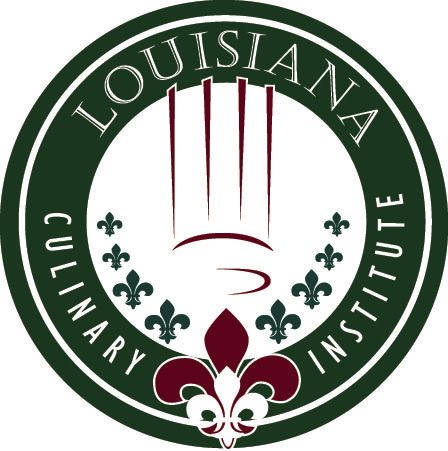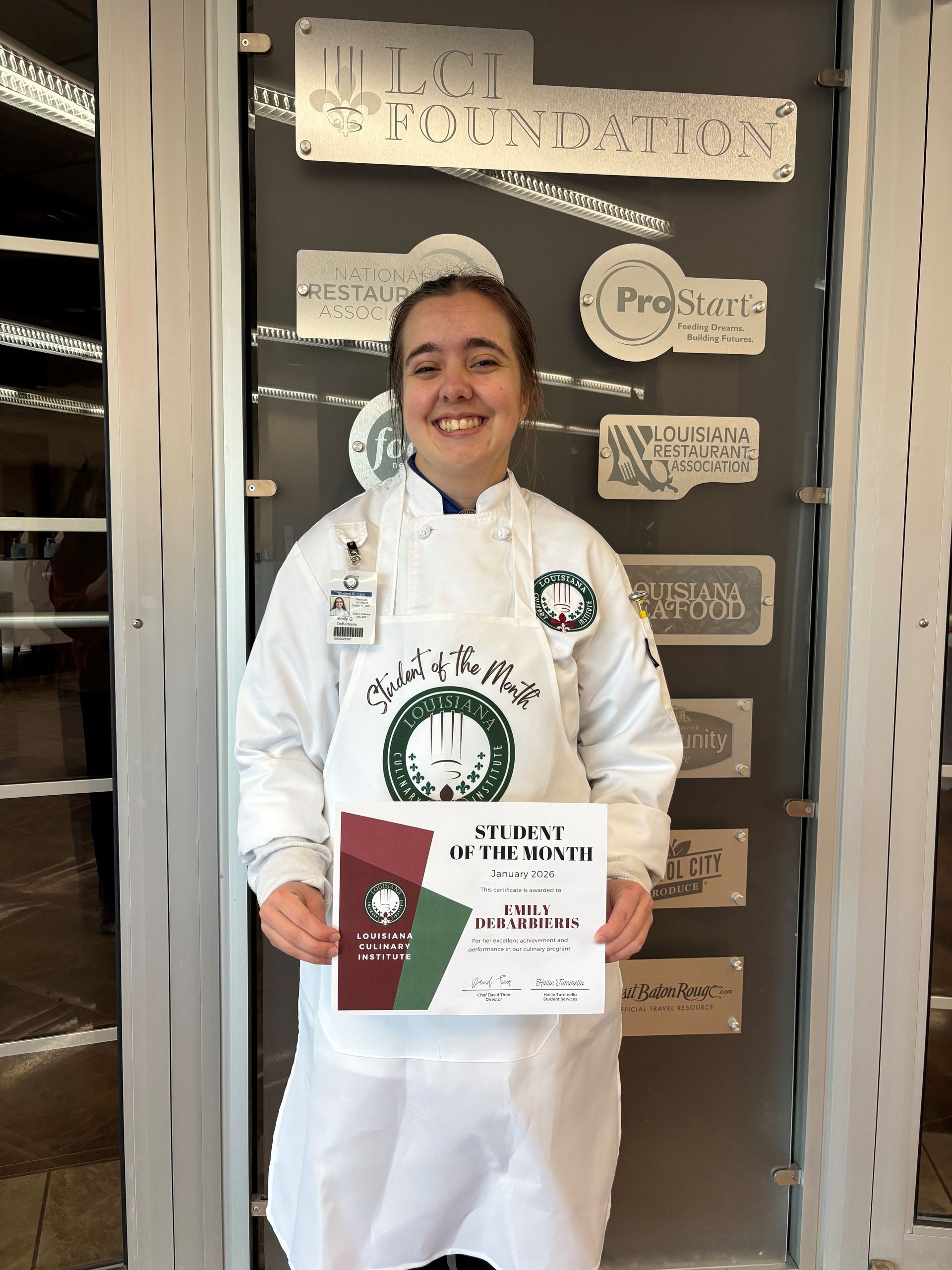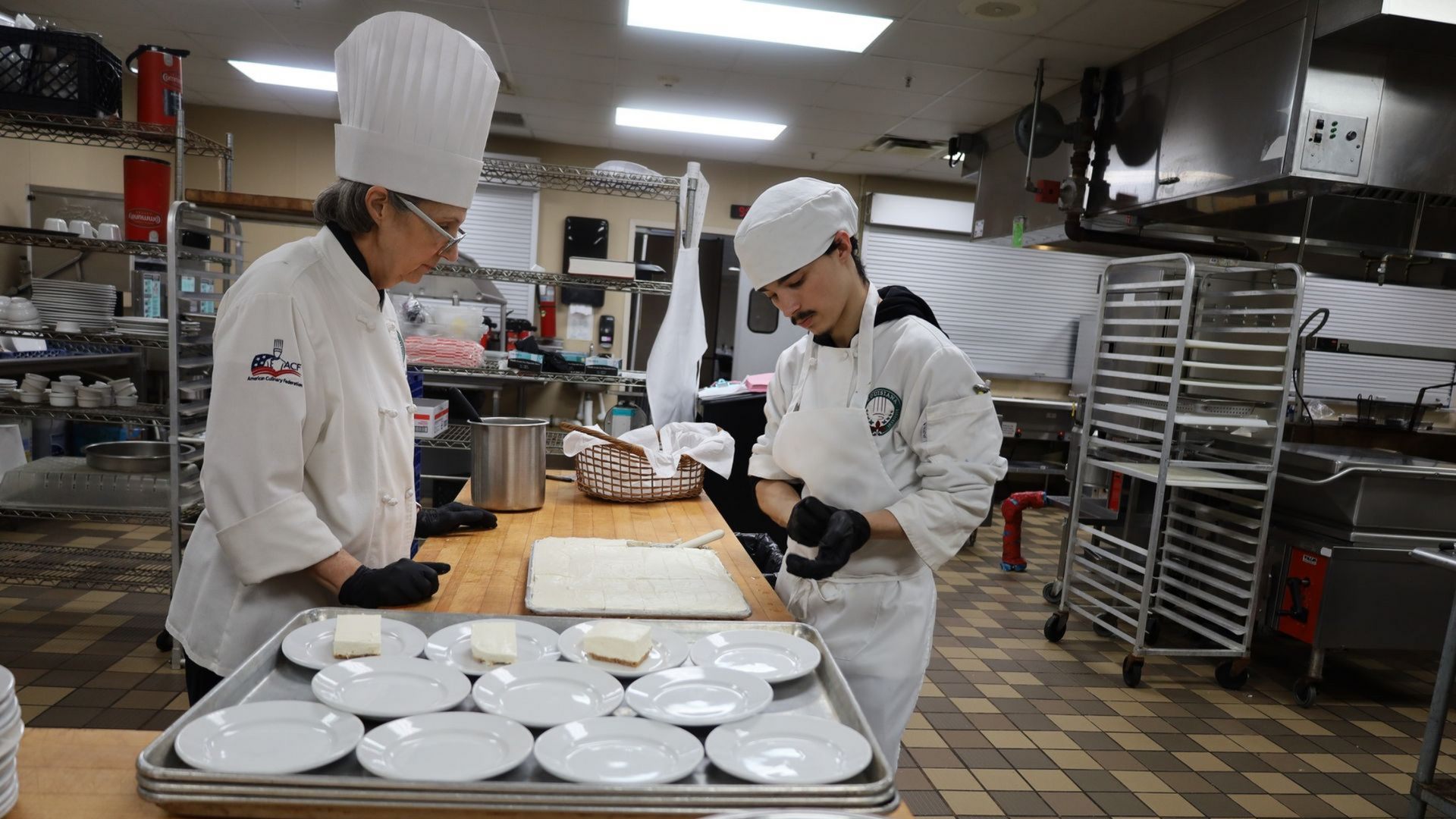Baking and Pastry Education: Exploring the Second Semester of Your Degree Program
The accelerated degree program at LCI picks up in the second semester right where the first one left off. With an established foundation, you can look forward to not only adding to your skills and knowledge but dive into more specialized techniques, procedures, and processes. Not only will your second Baking and Pastry semester expound upon what you’ve already learned and experienced, it further strengthens your culinary talent and prepares you for the remaining courses in your education and your future as a chef. [AD1] Let’s take a closer look at your second semester as a baking and pastry student at LCI.
Your second semester at Louisiana Culinary Institute in the Advanced Baking and Pastry degree program also referred to as Blue Level, is comprised of 10 courses.
CA 103 – Professional Cooking III (60 Lab Clock Hours / 2 Semester Credit Hours)
Students learn the basics of meat, poultry, and seafood cookery. Learn. To identify the primal cuts of beef,[AD2] lamb, veal, and pork, and list the fabricated cuts from each of them. The composition and structure of meat is described in terms of the relationship of the proper cooking techniques used in its cooking. Students are taught the proper handling and cooking of poultry, utilizing both dry and moist heat cooking methods with an emphasis on the correct procedure used for the “slow-roasting” of large birds.
-OR-
CA 110 – Introduction to Baking and Pastry (60 Lab Clock Hours / 2 Semester Credit Hours)
This course covers the fundamentals of the commercial kitchen bakeshop. Students are taught the fundamentals of bakeshop principles in relationship to how they are applied in cakes, pastries, cookies, ice creams, sorbets, and pie production in a commercial kitchen.
CA 122 – Restaurant Production II (30 Lab Clock Hours / 1 Semester Credit Hour)
The laboratory. Class is designed for students to practice proper cooking techniques in commercial foodservice. Students are given an extensive review of cooking techniques and procedures, measurements, knife skills, and mise en place and are required to prepare. And serve examples of each technique and procedure on meats, poultry, seafood, vegetables, and starches for the faculty/staff/student meal service.
CA 132 – Restaurant Service II (30 Lab Clock Hours / 1 Semester Credit Hour)
This laboratory class is designed for students to practice proper serving techniques in commercial foodservice. Students learn proper serving techniques and wait staff service management. At the end of this course, students take the National Restaurant Association Educational Foundation’s (NRAEF) ManageFirst® certification test for front of the house service management.
CA 105 – Professional Cooking V (30 Lecture Clock Hours / 2 Semester Credit Hours)
Students learn the basics of salads, sandwiches, and hors d’oeuvres cookery, as well as the basics of hot and cold food presentation and garnish. Students are introduced to the types of salads produced in foodservice and their preparation techniques. Techniques for the production of different types of sandwiches and the proper production of hors d’oeuvres are demonstrated. The students are also taught the importance of presenting food attractively and are shown techniques in the use of the balance of color, shape, texture, and the creation of garnishes.
CA 106 – Professional Cooking VI (30 Lecture Clock Hours / 2 Semester Credit Hours)
Students learn the basics of breakfast cookery, dairy products, and breakfast beverages. Students learn breakfast cookery with a focus on the many types of egg production, breakfast breads, and breakfast meats, and production of dairy products, including a good overall introduction to cheeses. Proper coffee and tea service is also taught in this course.
CA 123 – Restaurant Production III (30 Lab Clock Hours / 1 Semester Credit Hour)
Students practice cooking techniques. While preparing menu courses. For the faculty/staff/student meal service. Students will focus on preparing meats, poultry, seafood, vegetables, and starches utilizing both moist and dry heat cooking methods appropriately.
CA 133 – Restaurant Service III (30 Lab Clock Hours / 1 Semester Credit Hour)
Students practice techniques while serving food menu courses for. The faculty/staff/student meal service. Students cultivate their front of the house service and management techniques, including training on the MICROS system.
CA 211 – Introduction to Hospitality and Restaurant Management (30 Lecture Hours / 2 Semester Credit Hours)
An overview and introduction to the hospitality and restaurant management industry, with a specific focus on leadership and management techniques. As. A National Restaurant Association Educational Foundation’s. (NRAEF) ManageFirst® Program Core Credential course, students are eligible to take an NRAEF. Certification test at the end of this course. Cross-Listed with HCM 211.
CA 112 – Catering and Volume Food Service (30 Lecture Clock Hours / 2 Semester Credit Hours)
Introductory course on catering for foodservice and hospitality managers which utilizes sound guidelines and a practical approach to operating and managing a catering business. This course includes the guidelines for on no off premise catering, hiring, and managing catering personnel, writing contracts, sanitation, setting up a kitchen, setting. Up and using service equipment, conducting special events, and kosher catering along with wine and bar service, menu making and food presentation. Cross-Listed with HCM 112.
ENG 101 – English Composition (Humanities) (45 Lecture Clock Hours / 3 Semester Credit Hours)
A basic course on English grammar and composition designed to provide students with a detailed, structured approach to composition using the three steps of the writing process: pre-writing, writing, and rewriting. The course includes a review of grammar, offers opportunities for general and career-focused writing, and encourages improvement through addressing the writer’s audience and purpose and by providing tools for proofreading and editing.


